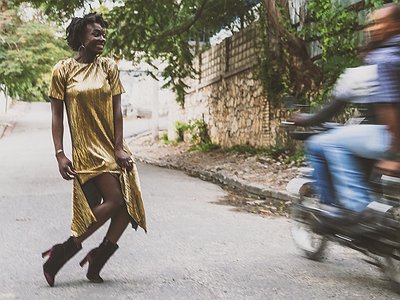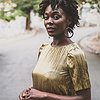Part 2
How do you make use of technology? In terms of the feedback mechanism between technology and creativity, what do humans excel at, what do machines excel at?
Technology is such a big part of my practice, particularly because I primarily write electroacoustic music. I used to do a lot of in-the-box processing in Reason or Ableton, and now I work mostly with a small number of synthesizers that I am learning to perform in my own voice, balanced with using electronics to manipulate recorded acoustic sounds. For me, I am constantly playing with where the acoustic and electronic meet, and how. Machines are good at forcing you to stumble into happy accidents and make something good of those moments. Humans are good at that too. :)
Collaborations can take on many forms. What role do they play in your approach and what are your preferred ways of engaging with other creatives through playing together or just talking about ideas?
I definitely work best collaboratively. I am simply at my happiest when creating and making music with others - I’ve never had a desire to be a soloist. In some ways, that’s my Haitian roots - music for us, culturally, is about gathering and creating collectively. It’s definitely one of the reasons I brought Spektral Quartet on for Fanm d’Ayiti. I knew that I could present a malleable work to them that they would be excited about shaping with me into our own sound, and I think we’ve done that so nicely on the album. I also took a collaborative approach in bringing on my creative partner of over a decade, Allison Loggins-Hull (Co-Director of Flutronix), and Tony Maimone (Studio G Brooklyn) who I’ve made all of my records with. They were the perfect co-producers of Fanm d’Ayiti, because we all trust each other so deeply, have an unspoken creative language we’ve developed over the years, and also challenge one another to do better always. Working with them shows me what true collaboration over the course of a career should feel like: family.
How is preparing music, playing it live and recording it for an album connected? What do you achieve and draw from each experience personally? How do you see the relationship between improvisation and composition in this regard?
These phases for me are each so different, exciting, and essential. Fanm d’Ayiti has gone through each of these phases, and is still evolving. For a very long time, I didn’t have a clue what the music would even end up being - I was just connecting with the history and narratives. Then the music came very quickly, all at once, and it really took on new life when I began work-shopping it with the St. Paul Chamber Orchestra musicians who premiered the work. Working with real players vs. only dealing with what’s in your mind or on your computer always leads to much more refined performative ideas. Partnering up with Spektral Quartet took the project to a brand new place in that we were working on it for the first time together to record, which is simply a very different representation of the work than the live performance; we were all aiming towards a perfect picture of the entire work, because recordings are less forgiving than live performances, and the expectation for perfection is present. Now that we’ve begun performing it live since recording the piece, it feels entirely brand new! We are playing with each other more and having much more fun improvising and taking our time in ways that the album didn’t allow for. I am also able to share much more of the historical narrative in the live show, which there wasn’t a ton of room for on the album. Audiences respond so nicely to having that context and personal connection to the narratives. I truly cannot wait for each of our tour stops this season - I think audiences will receive an even more new and improved version at each show.
How do you see the relationship between the 'sound' aspects of music and the 'composition' aspects? How do you work with sound and timbre to meet certain production ideas and in which way can certain sounds already take on compositional qualities?
Hmmmmm...do people see sound and composition as separate aspects? I hear all of this - everything around me - as music. So, it’s all fair game in each arena as far as I’m concerned.
Our sense of hearing shares intriguing connections to other senses. From your experience, what are some of the most inspiring overlaps between different senses - and what do they tell us about the way our senses work? What happens to sound at its outermost borders?
In performance, I think a lot about how music is impacted by sight - you as a physical presence on stage, what the lighting is like at a given moment, etc. It’s impossible to separate your sonic experience from your visual experience: it’s like watching a movie with very bad color and a terrible soundtrack. Not nearly as enthralling of an experience as seeing something on IMAX with high definition sound and emotionally compelling music. Even if you close your eyes to listen to music, it often evokes a visual in your mind’s eye. I love how intertwined the two are.
Art can be a purpose in its own right, but it can also directly feed back into everyday life, take on a social and political role and lead to more engagement. Can you describe your approach to art and being an artist?
I am definitely committed to art as activism, and Fanm d’Ayiti is testament to that. The women featured on the record used their voices to uplift the people of Haiti, in times of great political unrest and often in ways that put their own lives and those of their family members in danger. I was inspired by their stories, and how they aligned with my own. I am not living under dictatorial rule as they were, but our political and social situation is pretty dire to say the very least. I believe it is my responsibility as an artist to respond to and reflect our times honestly. If you look back historically, some of the greatest artistic movements coincide with some of the most trying times for humanity. I hope that my work is contributing to the current movement in process. I want to look back and know that I used my voice to fight for what I believe in: equality and freedom.
It is remarkable, in a way, that we have arrived in the 21st century with the basic concept of music and performance still intact. Do you have a vision of music and performance, an idea of what they could be beyond their current form?
But what are “basic concepts of music and performance”, and what does “intact” mean exactly in this context? Isn’t the fun of it that we...don’t really know the answers to those questions? That’s the future I’m excited for.






